A regional lockout is a class of digital rights management preventing the use of a certain product or service, such as multimedia or a hardware device, outside a certain region or territory. A regional lockout may be enforced through physical means, through technological means such as detecting the user's IP address or using an identifying code, or through unintentional means introduced by devices only supporting certain regional technologies.
In the history of video games, the fourth generation of video game consoles, more commonly referred to as the 16-bit era, began on October 30, 1987, with the Japanese release of NEC Home Electronics' PC Engine. Though NEC released the first console of this era, sales were mostly dominated by the rivalry between Sega and Nintendo across most markets: the Sega Mega Drive and the Super Nintendo Entertainment System. Cartridge-based handheld consoles became prominent during this time, such as the Nintendo Game Boy (1989), Atari Lynx (1989), Sega Game Gear (1990) and TurboExpress (1990).
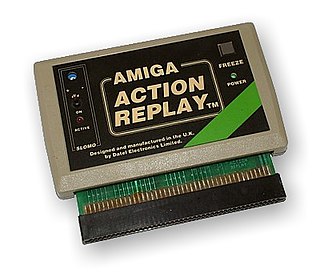
Action Replay is the brand name of a cheating device created by Datel. The Action Replay is available for many gaming systems including the Nintendo DS, Nintendo DSi, Nintendo 3DS, PlayStation Portable, PlayStation 2, GameCube, Game Boy Advance, and the Xbox. The name is derived from the first devices’ signature ability to pause the execution of the software and save the computer’s state to disk or tape for future “replay”. The ability to manipulate the contents of memory in this paused state permitted the cheat functions for which the brand is now better known.
In video game parlance, a multicart is a cartridge that contains more than one game. Typically, the separate games are available individually for purchase or were previously available individually. For this reason, collections, anthologies, and compilations are considered multicarts. The desirability of the multicart to consumers is that it provides better value, greater convenience, and more portability than the separate games would provide. The advantage to developers is that it allows two or more smaller games to be sold together for the price of one larger game, and provides an opportunity to repackage and sell older games one more time, often with little or no changes.
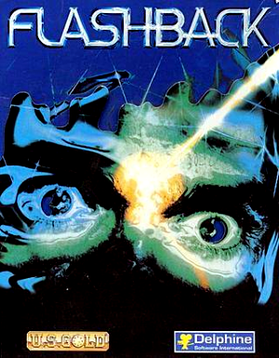
Flashback, released as Flashback: The Quest for Identity in the United States, is a 1992 science fiction cinematic platform game developed by Delphine Software of France and published by U.S. Gold in the United States and Europe, and Sunsoft in Japan.
Homebrew, when applied to video games, refers to games produced by hobbyists for proprietary video game consoles which are not intended to be user-programmable. The official documentation is often only available to licensed developers, and these systems may use storage formats that make distribution difficult, such as ROM cartridges or encrypted CD-ROMs. Many consoles have hardware restrictions to prevent unauthorized development.

Fantastic Dizzy is a 1991 video game developed by Codemasters. It is part of the Dizzy series. It was published on several platforms, including Mega Drive/Genesis, Master System, Game Gear, Nintendo Entertainment System, Amiga, and MS-DOS.
A multitap is a video game console peripheral that increases the number of controller ports available to the player, allowing additional controllers to be used in play, similar to a USB hub or a power strip. A multitap often takes the form of a box with three or more controller ports which is then connected to a controller port on the console itself.

Cool Spot is a 1993 platform game developed by Virgin Games USA for the Mega Drive/Genesis and Super Nintendo Entertainment System. The game was ported by other teams to Master System, Game Gear, Game Boy, Amiga, and MS-DOS in 1994. The title character is Cool Spot, a mascot for the soft drink brand 7 Up. Cool Spot's appearance in his own video game came at a time when other brand mascots were appearing in their own video games.

Home Entertainment Suppliers Pty. Ltd. is an Australian company that distributes computer games and gaming equipment. HES' offices are based in Riverwood, Sydney. HES's founder and managing director is Sebastian Giompaolo.

The Sega Genesis, known as the Mega Drive outside North America, is a 16-bit fourth generation home video game console developed and sold by Sega. It was Sega's third console and the successor to the Master System. Sega released it in 1988 in Japan as the Mega Drive, and in 1989 in North America as the Genesis. In 1990, it was distributed as the Mega Drive by Virgin Mastertronic in Europe, Ozisoft in Australasia, and Tectoy in Brazil. In South Korea, it was distributed by Samsung Electronics as the Super Gam*Boy and later the Super Aladdin Boy.
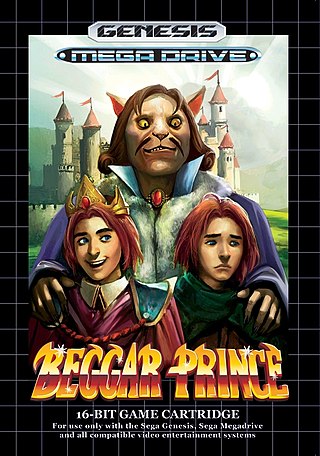
Beggar Prince, originally known as Xin Qigai Wangzi is a Taiwanese role-playing adventure game for the Sega Mega Drive/Genesis and PC. It was originally released in 1996 for the Sega Mega Drive/Genesis by C&E Inc. and later ported and released in 1998 on the PC.
Micro Machines is a series of video games featuring toy cars, developed by Codemasters and published on multiple platforms. The series is based on the Micro Machines toy line of miniature vehicles.
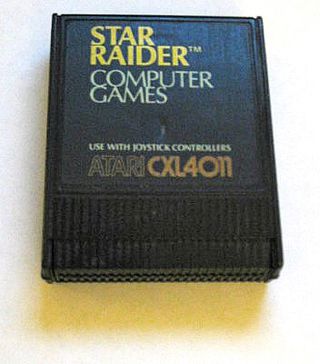
A ROM cartridge, usually referred to in context simply as a cartridge, cart, or card, is a replaceable part designed to be connected to a consumer electronics device such as a home computer, video game console or, to a lesser extent, electronic musical instruments.

A game backup device, informally called a copier, is a device for backing up ROM data from a video game cartridge to a computer file called a ROM image and playing them back on the official hardware. Recently flash cartridges, especially on the Game Boy Advance and Nintendo DS platforms, only support the latter function; they cannot be used for backing up ROM data. Game backup devices also make it possible to develop homebrew software on video game systems. Game backup devices differ from modchips in that modchips are used in conjunction with systems that use generally available media such as CDs and DVDs, whereas game backup devices are used with systems that use cartridges.

Pegasus is a clone of the Nintendo Famicom that was sold in the Czech Republic, Poland, Indonesia, Bosnia-Herzegovina and the Federal Republic of Yugoslavia during the early to mid 1990s.
The Sega Card, known in Japan as Sega My Card, is a memory card format used as game storage for the SG-1000/SC-3000 and the Mark III / Master System. Produced from 1983 to 1987 by Mitsubishi Plastics, the cards are plugged into onboard cardslots or into compatible adapters. Several versions of the format were created, including a rewritable one that allows new titles to be downloaded to a card. While substantially cheaper to produce than cartridges, the storage limitations of the format resulted in Sega exclusively distributing games on cartridges. Despite the failure of the Sega Card, NEC found more success with its own memory card format, the HuCard, which was the primary storage medium for its PC Engine game console.
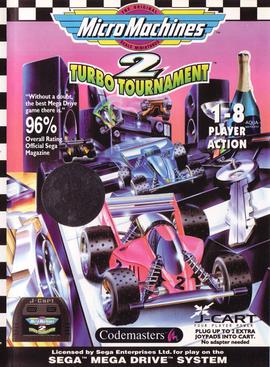
Micro Machines 2: Turbo Tournament is a 1994 racing video game developed by Supersonic Software and published by Codemasters for the Sega Mega Drive. The sequel to Micro Machines, the game is themed around Galoob's Micro Machines toys, and players race around environments in miniature toy vehicles. Micro Machines 2: Turbo Tournament adds new vehicles and game modes, and the Mega Drive version was released on J-Cart, enabling up to eight players without a multitap.

The Evercade is a handheld game console developed and manufactured by UK company Blaze Entertainment. It focuses on retrogaming with ROM cartridges that each contain a number of emulated games. Development began in 2018, and the console was released in May 2020, after a few delays. Upon its launch, the console offered 10 game cartridges with a combined total of 122 games.











